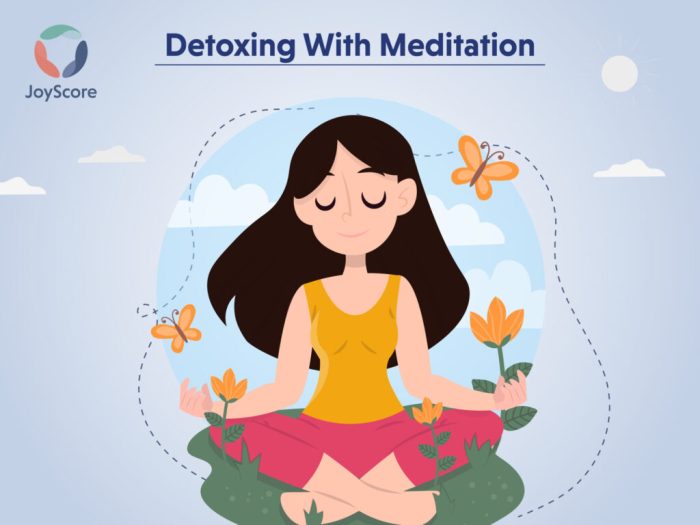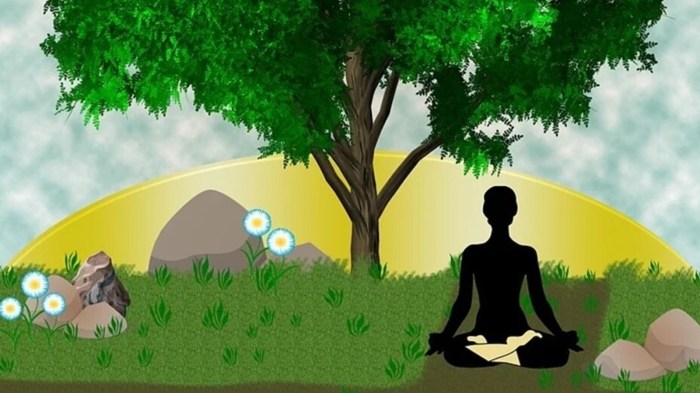How to Meditate for Mental Detoxification: Clear Your Mind with Meditation. Dive into the world of mental detox with this comprehensive guide on using meditation techniques to cleanse your mind and improve your overall well-being.
Learn about different meditation practices, setting up a peaceful environment, and the benefits of mental detox through meditation.
Introduction to Meditation for Mental Detoxification

Mental detoxification is the process of cleansing your mind from negative thoughts, emotions, and stress that can accumulate over time. Just like our bodies need detoxification to stay healthy, our minds also require regular cleansing to maintain well-being and clarity.Meditation is a powerful tool that can facilitate mental detoxification by helping you cultivate mindfulness, awareness, and inner peace. Through meditation practices, you can learn to observe your thoughts without judgment, release emotional baggage, and create a sense of calm within yourself.
How Meditation Helps in Mental Detoxification
- Meditation allows you to slow down and quiet the mind, giving you the space to identify and let go of negative thought patterns.
- By focusing on the present moment through meditation, you can reduce anxiety and stress, promoting mental clarity and emotional balance.
- Regular meditation practice can improve self-awareness, enabling you to recognize destructive thought patterns and replace them with positive ones.
Benefits of Mental Detox through Meditation
- Enhanced mental clarity and focus, leading to better decision-making and problem-solving skills.
- Reduced stress, anxiety, and depression, promoting overall emotional well-being.
- Improved self-awareness and self-compassion, fostering a positive relationship with yourself and others.
Understanding the Basics of Meditation

Meditation is a practice that involves focusing the mind and eliminating the clutter of thoughts to achieve a sense of calmness and clarity.
When it comes to reducing anxiety, meditation can be a powerful tool. By practicing How to Meditate to Reduce Anxiety: 7 Key Techniques , you can learn to calm your mind and find inner peace. These techniques focus on mindfulness and deep breathing, helping you to alleviate stress and anxiety.
Types of Meditation Techniques, How to Meditate for Mental Detoxification
- Mindfulness Meditation: Involves being fully present in the moment, observing thoughts and sensations without judgment.
- Transcendental Meditation: Uses a mantra or sound to transcend conscious thought and reach a state of deep relaxation.
- Loving-Kindness Meditation: Focuses on developing feelings of love and compassion towards oneself and others.
- Guided Meditation: Involves following the instructions of a guide or teacher to lead you through the meditation practice.
The Importance of Breathing in Meditation Practices
One of the fundamental aspects of meditation is the focus on the breath. Proper breathing techniques help in calming the mind, reducing stress, and promoting relaxation.
Mental fatigue can be overwhelming, but meditation can help you overcome it. By practicing the techniques in How to Meditate to Overcome Mental Fatigue , you can rejuvenate your mind and body. These methods focus on mindfulness and self-awareness, allowing you to recharge and combat mental exhaustion.
Creating a Peaceful Environment for Meditation

When it comes to meditation, the environment plays a crucial role in enhancing the overall experience. A calm and quiet space can help you focus better and achieve a deeper state of relaxation. Here are some tips on setting up a serene atmosphere for your meditation practice.
For those seeking greater relaxation and peace, meditation offers a path to tranquility. By following the steps outlined in How to Meditate for Greater Relaxation and Peace , you can create a serene space within yourself. Through guided meditation and visualization, you can achieve a state of deep relaxation.
Setting up a Calm and Quiet Space
- Choose a quiet area in your home where you are less likely to be disturbed.
- Use a comfortable cushion or mat to sit on during meditation.
- Avoid clutter in the space to minimize distractions and promote a sense of calm.
Significance of Lighting and Aromatherapy
- Soft, natural lighting can create a soothing ambiance for meditation. Consider using candles or dimmable lights.
- Aromatherapy with essential oils like lavender or sandalwood can help relax your mind and body, enhancing the meditation experience.
- Experiment with different scents to find the ones that resonate with you and promote a sense of peace and tranquility.
Decluttering for Enhanced Meditation
- Clearing out the physical clutter in your meditation space can also declutter your mind, allowing for better focus and concentration.
- Organize your space in a way that promotes a sense of openness and calmness, helping you feel more at ease during meditation.
- Regularly decluttering your meditation area can create a harmonious environment that supports your mental detoxification journey.
Techniques for Meditating for Mental Detoxification

In order to effectively detoxify your mind, it is essential to practice specific meditation techniques that promote relaxation, focus, and the release of negative thoughts. By incorporating these techniques into your meditation routine, you can achieve a clearer and more peaceful state of mind.
Focus on the Present Moment
One of the key aspects of meditation for mental detoxification is learning how to focus on the present moment. This involves letting go of distractions from the past or worries about the future, and instead, focusing on the sensations and experiences of the present moment.
Visualization Techniques for Releasing Negative Thoughts
Visualization can be a powerful tool for releasing negative thoughts during meditation. One technique involves imagining a bright light entering your body as you inhale, and envisioning it carrying away all negativity as you exhale. Another method is to visualize yourself surrounded by a protective bubble that repels negative energy.
Deep Breathing and Relaxation Methods
Deep breathing exercises can help calm the mind and body, making it easier to release tension and negative emotions. Practice diaphragmatic breathing, where you inhale deeply through your nose, allowing your abdomen to expand, and exhale slowly through your mouth. Combine this with progressive muscle relaxation, where you tense and then release each muscle group in your body, starting from your toes and working your way up.
Benefits of Meditating for Mental Detoxification: How To Meditate For Mental Detoxification

Regular meditation practice offers a multitude of benefits that can significantly improve mental health and well-being. Let’s explore how meditating for mental detoxification can enhance your overall quality of life.
Improved Mental Clarity
- Meditation helps clear the mind of clutter and distractions, allowing for better focus and concentration.
- By practicing mindfulness, you can train your brain to stay present and avoid getting caught up in negative thought patterns.
- Enhanced mental clarity can lead to better decision-making and problem-solving skills.
Reduction of Stress and Anxiety
- Regular meditation has been shown to reduce levels of cortisol, the stress hormone, in the body.
- By calming the mind and body, meditation can help alleviate symptoms of anxiety and promote a sense of inner peace.
- Deep breathing techniques used in meditation can trigger the body’s relaxation response, reducing stress levels.
Enhanced Overall Well-being
- Through mental detoxification, meditation can help improve sleep quality and boost mood.
- Increased self-awareness and emotional regulation are common benefits of regular meditation practice.
- By fostering a sense of inner peace and contentment, meditation can enhance overall quality of life and promote a positive outlook.
In conclusion, incorporating meditation into your routine can lead to a clearer mind, reduced stress, and enhanced mental well-being. Start your journey to mental detox today and experience the transformative power of meditation.